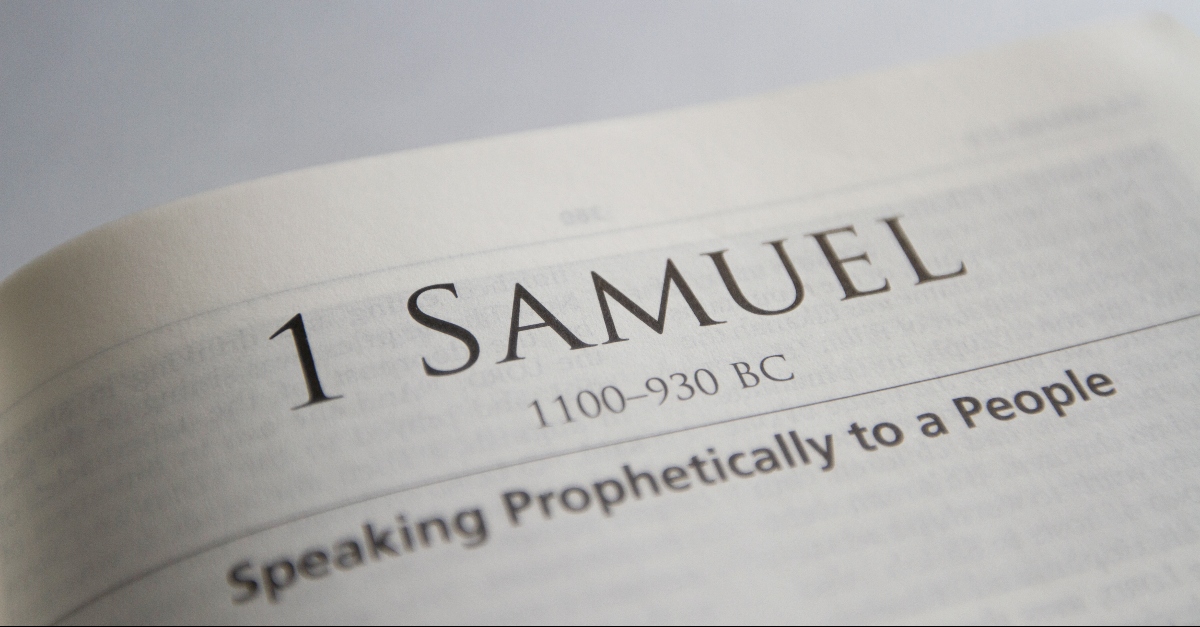These are all of the chapters of the book of 1 Samuel. Clicking on a chapter will show you the text of that chapter of 1 Samuel in the Bible (New International Version).
The authorship of 1 Samuel is unknown. This book, along with 2 Samuel, was originally a single volume in the Hebrew canon. Traditionally, the prophet Samuel was considered the author of the books of Samuel, and it is likely that he contributed to it. However, Samuel died prior to the completion of 1 Samuel, meaning he could not be its only author.
In 2 Samuel 1:18, we find a reference to the Book of Jashar. 1 Chronicles 27:24 mentions the Annals of David and 1 Chronicles 29:24 mention the records of Samuel, Nathan, and Gad. The references in 1 Chronicles do not prove that these other records were used as sources in 1 Samuel, but it is clear there were multiple historical records available for whoever did write 1 Samuel.
Adam Clark concludes that (1) the books of Samuel and Kings were constructed using original documents; (2) that the compiler was not contemporary with the events he narrates; (3) that the date and authorship of these books, while more recent that the events records are uncertain.
1 Samuel is one of the books that Christians label as historical. But the Hebrews included 1 Samuel in a grouping called the Former Prophets. The Former Prophets included Joshua, Judges, and the books of Samuel and Kings. These books reflect the teachings of the Torah.
Barker and Kohlenberger identify three major characters in the books of Samuel: Samuel, the kingmaker; Saul, abortive king; and David, the ideal king. 1 Samuel tells the complete story of the first two of these and begins the story of the third.
Samuel serves as a transitional character. He is the last of the Judges and was instrumental in establishing the monarchy. Samuel anointed both of Israel’s first two kings; Saul and David.
Saul is the first King of Israel. In many ways, Saul serves as a foil to David. While he is a strong military leader, he is a poor spiritual example and leader for his nation. Prior to Saul’s kingship, Israel was a loose coalition of tribes. Under Saul’s leadership, they began to come together into a more cohesive nation.
The later part of 1 Samuel recounts David’s rise in influence in Israel, his conflict with Saul, and his life as an outlaw. During all this David is cast in a favorable light. He is one who depends on the Lord and seeks to follow him. Throughout 1 Samuel, David is pictured as blameless.
Robert Bergen identifies five potential purposes for the writing of 1 Samuel. It is, first of all, a book of history – it chronicles the life and ministry of Samuel, the last of the judges, it records the calling and reign of Saul, the first king of Israel, and it introduces David, recounting the tension between David and Saul.
The second potential purpose that Bergen identifies is that it is a work of literature. The central plot of 1 Samuel involves kings, international wars, ambition, murder, and deception. It has complex character portrayals, varied settings, wordplay, and allusions. While 1 Samuel is certainly more than just literature, it clearly does display many of the characteristics of a classic piece of literature.
1 Samuel also has some of the characteristics of an apology. The book clearly describes Saul’s fall from favor alongside David’s rise. Saul is shown to be a man who was unqualified to lead God’s people. while David is shown as a faithful subject to Saul, unwilling to do anything to overthrow Saul. Instead, David’s rise to the kingship is clearly revealed to be the work of God.
1 Samuel is also a book of theology, supporting the teachings of the Torah. The book supports the idea of a covenant God, one who has a covenantal relationship with his people. It also supports the emphasis of the Torah on the possession of the land of Israel. There is an emphasis on the presence of God among the people and there is a call for wholehearted obedience to God.
Finally, 1 Samuel can be viewed as Scripture. This book is part of the inspired Word of God that has been used by Jew and Christian alike for insight into God’s working in the world. And it offers encouragement to live faithfully before God.
1 Samuel begins with a moving story about Samuel’s birth and dedication to God. Many Christian parents have a dedication service for their young children. But not many follow through the way that Hannah did. Hannah literally gave her son to the service of the Lord. Because of this, the Lord blessed both Hannah and Samuel. The Lord honors our heartfelt and total commitment to himself.
In the fourth chapter of 1 Samuel we find Israel fighting against the Philistines. And losing. Their solution was to bring the Ark of the Covenant into battle with them. They thought that by doing so, God would fight for them and they would be victorious. But it was a disaster and the Ark was lost. We cannot manipulate God to grant us his favor. It is only when our hearts are right before him that we should expect to know his presence.
That lesson is reinforced in 1 Samuel 15. Here Saul partially obeys God by attacking and destroying the Amalekites. But he saves some of the best for himself and his men. When Samuel confronts him over it, he excuses his actions, claiming he saved the best to offer as a sacrifice. Samuel responds with one of the most significant passages in the Old Testament: “To obey is better than sacrifice.” God does not care all that much about our outward acts of worship. He is much more interested in our obedience.
The selection of David, in 1 Samuel 16, offers another lesson to us today. We look at the outward appearances of a person and their achievements, but God looks at what is on the inside. David was the runt of the litter. Yet God saw something special in him and made him into the second, and greatest, king of Israel.
David’s battle with Goliath in 1 Samuel 17 demonstrates that human might and power is no match for God’s strength. Humanly speaking, David stood no chance of beating Goliath. It was the ultimate mismatch. And the battle between them was as short as expected. But the outcome was totally unexpected – to all but David. He trusted in God to help him overcome, and he was victorious.
1 Samuel 3:10b: “Speak, for your servant is listening.” This was Samuel’s response to God’s calling.
1 Samuel 12:3: “Here I stand. Testify against me in the presence of the Lord and his anointed. Whose ox have I taken? Whose donkey have I taken? Whom have I cheated? Whom have I oppressed? From whose hand have I accepted a bribe to make me shut my eyes? If I have done any of these things, I will make it right.” This reflects the integrity of Samuel. He did not enrich himself at the expense of the people he led.
1 Samuel 12:22: “Does the Lord delight in burnt offerings and sacrifices as much as in obeying the Lord? To obey is better than sacrifice, and to heed is better than the fat of rams.”
1 Samuel 16:7: “But the Lord said to Samuel, ‘Do not consider his appearance or his height, for I have rejected him. The Lord does not look at the things people look at. People look at the outward appearance, but the Lord looks at the heart.’”
1 Samuel 17:45: “David said to the Philistine, ‘You come against me with sword and spear and javelin, but I come against you in the name of the Lord Almighty, the God of the armies of Israel, whom you have defied.’” These were David’s words to Goliath before he killed him with a slung stone and cut off his head.
1 Samuel 24:6: “He said to his men, ‘The Lord forbid that I should do such a thing to my master, the Lord’s anointed, or lay my hand on him; for he is the anointed of the Lord.’” David’s commitment not to harm the Lord’s anointed should be a lesson to churches today.
 Ed Jarrett is a long-time follower of Jesus and a member of Sylvan Way Baptist Church. He has been a Bible teacher for over 40 years and regularly blogs at A Clay Jar. You can also follow him on Twitter or Facebook. Ed is married, the father of two, and grandfather of three. He is retired and currently enjoys his gardens and backpacking.
Ed Jarrett is a long-time follower of Jesus and a member of Sylvan Way Baptist Church. He has been a Bible teacher for over 40 years and regularly blogs at A Clay Jar. You can also follow him on Twitter or Facebook. Ed is married, the father of two, and grandfather of three. He is retired and currently enjoys his gardens and backpacking.
